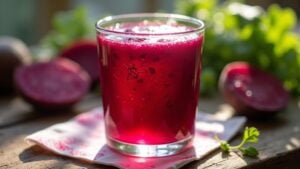Beetroot juice packs a powerful nutritional punch, but it could come with a few unexpected downsides. While many focus on its benefits, few realize it can contribute to kidney stones, lower blood pressure too swiftly, or even upset digestion. Some people might experience mineral absorption issues or allergic reactions, adding another layer of caution. Then there’s that startling—yet harmless—effect of turning urine pink. What else should people be aware of?
May Increase Risk of Kidney Stones
Beetroot juice, while packed with nutrients, can pose a risk for kidney stones due to its high oxalate content. Oxalic acid in the juice binds with calcium, forming crystals that could develop into painful kidney stones.
Excessive consumption increases the risk of kidney stone formation, especially for those with inherent health conditions like a history of stones or kidney issues. To reduce the risk, moderation is key—limiting intake and drinking plenty of water helps flush out excess oxalates.
Those prone to stones should consult a doctor before adding beetroot juice to their diet. While it offers health benefits, balancing consumption prevents complications. Small adjustments can make a significant difference in avoiding unnecessary discomfort.
Could Cause Sudden Drop in Blood Pressure
A glass of deep-red juice could seem harmless, but for some, it might lead to an unexpected plunge in blood pressure. Beetroot juice contains nitrates that relax blood vessels, which can cause a sudden drop in blood pressure—especially risky for those with already low levels or on blood pressure medications.
Dizziness & Fainting: A rapid decrease in blood pressure could trigger lightheadedness or even fainting, particularly after intake.
Medication Interactions: Combining beetroot juice with blood pressure-lowering drugs can amplify adverse effects, leading to unsafe drops.
Monitoring Matters: Regular checks are vital for those drinking beetroot juice to avoid unintended side effects from its potent impact.
While beneficial for some, the juice’s effects on blood vessels demand caution to prevent discomfort or health risks.
May Lead to Digestive Discomfort
Though packed with nutrients, this vibrant juice doesn’t always sit well with everyone. Drinking beetroot juice daily can lead to digestive discomfort, particularly for those with sensitive stomachs. The high acidity and fermentable fiber in beetroot juice can cause bloating, gas, or even diarrhea, especially when consumed on an empty stomach.
Some people experience abdominal pain if they drink too much or have it before meals. Pairing the juice with food may help ease these side effects. Whereas beetroot supports blood pressure and kidney health, moderation is key—overdoing it overwhelms digestion.
Those prone to digestive issues should begin with small amounts and monitor their stomach’s response to avoid discomfort. Adjusting intake frequently makes a difference.
Might Interfere With Mineral Absorption
Rich in nutrients yet surprisingly tricky for some, beetroot juice’s high oxalate content can throw a wrench into mineral absorption. Oxalates bind to essential minerals like calcium, iron, and zinc, potentially reducing their uptake and leading to deficiencies over time. This interference is particularly concerning for those with existing mineral deficiencies or on medications that affect nutrient levels.
- Calcium & Iron Blockers: Oxalates can hinder absorption of these key minerals, impacting bone health and energy levels.
- Zinc Depletion: Studies show regular beetroot juice consumption can lower zinc levels, critical for immunity and metabolism.
- Moderation Matters: Balancing intake with other nutrient-rich foods helps mitigate risks.
For ideal health, pairing beetroot juice with vitamin C-rich foods can boost iron absorption, while spacing it apart from mineral-heavy meals may reduce interference. Consulting a healthcare provider guarantees personalized advice.
Can Cause Allergic Reactions in Some Individuals
While beetroot juice offers many benefits, it’s vital to recognize that some people could experience allergic reactions. Though uncommon, beetroot allergies can cause symptoms like hives, throat tightness, or even severe breathing difficulties. Those with a history of food allergies should consult a healthcare provider before consuming it, as reactions could escalate quickly.
The risk is higher for individuals sensitive to similar plants, like spinach or chard. In spite of the health benefits of beetroot, potential side effects shouldn’t be disregarded. Mild reactions might include itching or digestive discomfort, while severe cases could lead to anaphylaxis. Monitoring for unusual symptoms is key, especially when trying beetroot for the initial time. Should any adverse effects occur, stopping use and seeking medical help is advised to guarantee safety.
May Temporarily Discolor Urine or Stools
Even though beetroot juice is packed with nutrients, it can lead to a surprising but harmless side effect—pink or red urine and stools. This condition, called beeturia, occurs when the body processes the pigments found in beetroots. While alarming at first, the discoloration of urine and stools is temporary and resolves once beetroot intake diminishes.
- Who’s affected: Beeturia occurs in roughly 14% of people, particularly those with iron deficiency, as their bodies might grapple to break down the pigments.
- Digestive impact: The juice’s high oxalates can cause gas, stomach cramps, or digestive discomfort in some, though unrelated to discoloration.
- Not a concern: Unlike blood in urine or stools, beeturia poses no health risks and doesn’t require treatment.
Conclusion
Beetroot juice offers notable benefits but comes with risks like kidney stones and low blood pressure. Surprisingly, about 10-15% of kidney stone cases involve oxalates, which beetroots contain in high amounts. Whereas enjoying it, moderation is key—listen to your body and check in with your doctor when you’re unsure. Something as simple as a glass of beet juice can have powerful effects, so balance is everything.





